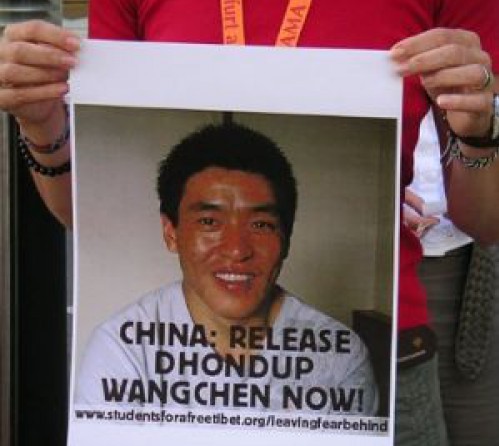Half of Press Freedom Honorees in Jail Amid Record Imprisonment
by Sampsonia Way / November 26, 2012 / No comments
By Mary Childs and Carol Hymowitz / Bloomberg
Dhondup Wangchen and Azimjon Askarov couldn’t accept their awards on Tuesday, November 20 at the International Press Freedom Awards because both are imprisoned for their work.
Wangchen, a Tibetan filmmaker, was given a six-year sentence in China in 2010 for his documentary “Leaving Fear Behind,” which chronicled Tibet under Chinese rule. Askarov has been imprisoned since 2010 in Kyrgyzstan, where he serves a life sentence on various charges after documenting ethnic clashes.
Mae Azango, a Liberian journalist whose life was threatened for her articles about female genital mutilation, and Mauri Konig from Brazil, who was beaten and left for dead during his investigation into human trafficking, were present to accept their awards from the Committee to Protect Journalists at the Waldorf-Astoria hotel in New York. CPJ promotes press freedom and supports imperiled journalists worldwide.
The CPJ, Amnesty International and other organizations helped pressure Liberia to suspend female circumcision, which has been used on as many as two out of three Liberian girls, Azango said in an interview before the awards ceremony.
“When protests came from the Committee to Protect Journalists and Amnesty International and others, the government was pushed to speak up,” Azango said. “But it’s still going on, it’s a long tradition, so I’ll continue to talk and write about it.”
Female journalists are proving male journalists wrong that they only go after soft news, Azango, who calls herself the “voice of the voiceless,” said in her acceptance speech.
Functioning Democracies
CPJ, based in New York, has documented 55 journalists killed in 2012, according to its website. Today there are at least 179 journalists imprisoned, a record in the CPJ’s history, Gwen Ifill, a broadcaster for PBS, said last night. Press outlets filled the tables at the awards ceremony and fundraising dinner, the most successful on record with more than $1.6 million, according to the CPJ.
Fewer than 10 percent of journalists’ murderers are brought to justice, said David Boies, a lawyer and chairman of the dinner. Some of the worst offending countries are functioning democracies, he said.
“I’ve spent the past 12 years walking the Brazilian border with Paraguay and Argentina to report on trafficking of children,” Konig said in an interview before the awards ceremony. “They continue to be the victims.”
This article was originally published by Bloomberg





